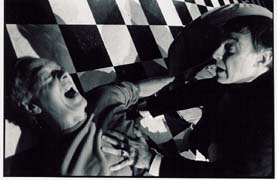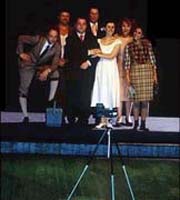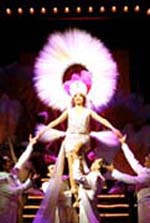
KOMISAR'S CURTAIN-RAISERS
by Lucy Komisar
Contents: September 17, 2001:
Can Themba's "Le Costume" (The Suit)
"Légendes de la Forêt Viennoise" (Tales
of the Vienna Woods)
"Mistinguett"
"Le Dîner de Cons" (The Dinner Game)
 |
"Le Costume" (The Suit)
|
||
|
Peter Brook's production of "Le Costume" is
a beautiful elegiac fable that tugs at the soul. Premiered in Paris
at his Bouffes du Nord theater, it is touring Europe. One hopes it will
come to New York.
|
|||
| Hubert Kounde and Sotingui Kouyate in "Le Costume", directed by Peter Brook | |||
Based on a story by the late South Africa writer, Themba Can, is tells of the poetic vengeance that a husband takes on an unfaithful wife.
This is a tale that Themba Can told in the fifties in a township "shabeen," a clandestine, illegal café (all gathering places for blacks were illegal) where writers, musicians and outcasts met to talk, tell stories, recite poetry, play music, drink. Can held forth each evening at his table and it was there he recounted the story of Philemon and Mathilda.
An old man, Maphikela (Sotigui Kouyaté), tells the listeners about the great love of Philemon (Hubert Koundé) and his wife Matilda (Yanya Moodie). And we see them in their one-room shack, a place drawn almost in outline, a cot covered with a black and white throw, a coat rack, two plain wood chairs, a small table.
It's a morality tale about a loving husband deceived by a wife. Yet, the tragedy engulfs them both. He treated her as a queen, he was "too good for her," says the storyteller.
She was bored during the day at home. She imagined singing in a night club; when he made love to her, she closed her eyes and thought of someone else." When she acts out her fantasy, and Philemon finds out, his revenge involves the suit left behind by the fleeing lover (Cyril Guei). To tell more would be to give away the tale.
The actors effect the pantomimes of daily life, wash dishes,
play at cards, attend a jazzy party at which a few people play all the guests.
It's funny and then cruel, like their lives, and superbly acted.
"Légendes de la Forêt Viennoise" (Tales of
the Vienna Woods)
|
|
|
| This powerful evocation of the petit bourgeois of Vienna in the 1920s gets an excellent stylized staging by Laurent Gutmann. The Austrian Horváth von Ödön wrote the piece in 1931, a story about people's dreams and failure, part comedy, part melodrama. The innocence is shown to be fraud and then segues into the decadence of the Nazi years, illuminating the ease with which many took to fascism. | ||
|
The cast of "Tales
of the Vienna Woods." Photo by Jean-Paul Lozouet
|
||
Austria is in economic recession. A street of the capital, represented by three rectangles - doors - cut into a black wall like bits of modern art, set off by street lamps and sidewalk. They are toy store, a butcher shop, a tobacconist.
Marianne (Sophie Rodrigues) is about to marry the Oscar, the rich butcher (Philippe Frécon). An old peasant woodworker wants his disreputable son Alfred (Marc Bodnar), who squanders his money, to marry a girl with wealth. Alfred is kept by Valérie (Annie Mercier), the older manager of a tobacco shop. (All the actors are first rate.)
At the wedding picnic (surrealistically held on painted green grass), she sees Alfred, tacky in his undershirt as a way out of destined boredom.
She makes all the wrong choices, which lead inevitably lead to decadence. That's represented by music hall where a seductive blonde showgirl in braids and dirndle entertains a disabled vet and a Nazi.
The play is broad and cartoonish and crammed with truths. War is coming. A woman remarks, "It will be the end of civilization." Or it's competition, comes the reply.
A successful playwright in Berlin, this work got von Ödön the Kleist prize. A few years later, his work was banned and his life was threatened. After the Anschluss of 1938, he planned to come to the U.S. Has killed in Paris by a tree that fell on him in front of a theater.
"Mistinguett"
|
|
|
| This musical à la française is more akin to the music hall than what one might see on Broadway. Jérôme Savary, who previously put on musicals at the Trocadero nightclub, preserves the style of the old review. It's brassy and hokey with by-the-numbers musical production numbers and a plot and dialogue that are downright silly. | ||
|
Liliane Montevecchi as
Mistinguett
|
Though one misses a good book, the production might be considered à propos since it's about the life of Mistinguett, who was born in 1875 and reigned over the pre-war Parisian music hall. The tale follows a woman, now in her 40s, who had built a career but not a life. On her dressing room wall is a photo of Maurice Chevalier, who was her lover.
The conflicts involve a young ingénue, Lily (Nina Savary), who falls for Jacques (Antoine Maurel), the man the theater money people order to propose to Mistinguett. Savary, the director's daughter, is terrific as Lily, infecting her with the charm of a Leslie Caron.
But the plot is largely an excuse for jazzy, brassy music, for chorus boys in caps and suspenders or top hats and tails. For production numbers that evoke Latin America with dancers wearing pastel pompoms and feathers or the Sheikdoms of Araby with men in harem pants and fezes.
Mistinguett appears in black sheer and sequins at a smoky bordello replete with bare-breasted women. It's as if Savary was making clear that men then and now aim such entertainments at each other.
Not that the show (or the shows of the time) didn't give offense to others as well. Male dancers do a number in a caricature of black face. A midget (Carlos Pavlidis) is decked out in absurd costumes, including one in drag.
For all the glitter, the show lacks spark, as if those dance extravaganzas
had been dredged from a vault. Still, the audience, mostly elderly, clapped
and swayed to the songs, sometimes uttering a response: "C'est vrai"
or "Ça, c'est Paris." It works as nostalgia.
 |
"Le Dîner de Cons" (The Dinner Game)
|
|
| Christian Erickson and Les Clack in The Dinner Game, directed by Patricia Kessle | ||
"Who's the idiot?" asks Francis Verber's ironic play. Is it the wealthy, sophisticated publisher Pierre Brochant (Christian Erickson) who competes at his friends' weekly dinner to bring the guest the man everyone will later vote the most idiotic? Or is it Francois Pignon (Les Clack), the mild finance ministry accountant who is devoted to making matchstick models of landmarks, and arrives at Brochant's apartment unknowingly to be the evening's entertainment?
Verber's slapstick farce dissects the perverse. He says it's based on a true "game" by Parisian men. The play premiered in Paris in 1993. But though this production features excellent acting, it has a hard time getting by the silliness of the plot. It's a combination of sitcom and French boulevard comedy – neither a compliment.
Brochard's bait is the hint he might publish the photos of Pignon's models, which include the Eiffel Tower, the Concorde, and the Golden Gate Bridge. Pignon arrives at the apartment, to find Brochant suffering emotionally and physically. His wife, Christine (Lia Jacobs), who he'd been cheating on, has left. He's determined to her, and suspects she's fled to his former friend, Juste Leblanc (Robert Dauney) , from whom he'd taken her a few years earlier.
And then his back fails him, too.
Good-natured Pignon is ready to help. He commiserates. His wife left him, too. Every bit of help gets Brochard deeper into trouble. Pignon meets the publisher's nymphomaniac mistress and takes her for the wife. So when the wife arrives back, ready to forgive, he thinks it's the mistress and …
Like a lot of rich French people, Brochart cheats on his taxes. Pignon helpfully calls on a colleague, another tax inspector, to help locate the fellow where the wife may have gone. But, Brochard suddenly worries about appearing too prosperous and cuts his fancy wine with vinegar. He can't do much to hide the obvious places on the wall which used to hold the paintings he's stashed in the bathroom.
After a while, the notion gets ridiculous. Why doesn't Brochard just throw the troublesome Pignon out? He seems like a bigger fool than the accountant. Maybe that's the point.
Christian is wonderful expressive as Brochard, his face a map of cruelty; he has an extraordinary ability to express volumes with his eyes. Pignon, played by British Les Clack, is a marvelous sensitive clown. The actors are better than their script. [Komisar]
Theater critic Lucy Komisar gives pre-show briefings and post-show discussions for theater parties to enrich playgoers' experiences. She'll also help find an appropriate show and make or advise on arrangements. Interested parties may telephone (212) 929-1610 for information.

| home |
reviews |
cue-to-cue |
discounts |
welcome |
| museums |
NYTW mail |
recordings |
coupons |
publications |
classified |

